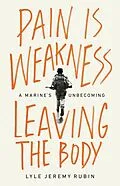An honest reckoning with the war on terror, masculinity, and the violence of American hegemony abroad, at home, and on the psyche, from a veteran whose convictions came undone
When Lyle Jeremy Rubin first arrived at Marine Officer Candidates School, he was convinced that the "war on terror" was necessary to national security. He also subscribed to a strict code of manhood that military service conjured and perpetuated. Then he began to train and his worldview shattered. Honorably discharged five years later, Rubin returned to the United States with none of his beliefs, about himself or his country, intact.
In Pain Is Weakness Leaving the Body, Rubin narrates his own undoing, the profound disillusionment that took hold of him on bases in the U.S. and Afghanistan. He both examines his own failings as a participant in a prescribed masculinity and the failings of American empire, examining the racialized and class hierarchies and culture of conquest that constitute the machinery of U.S. imperialism. The result is a searing analysis and the story of one man's personal and political conversion, told in beautiful prose by an essayist, historian, and veteran transformed.Autorentext
Lyle Jeremy Rubin is a veteran of the war in Afghanistan who writes about capitalism and U.S. empire. He has a doctorate in history from the University of Rochester and has contributed to a variety of publications, including the New York Times, the Washington Post, The Guardian, The Nation, Raritan, and n+1. When he is not working or reading, he likes to pay attention to the birds.
Klappentext
An honest reckoning with the Forever War, masculinity, and the violence of American hegemony abroad, at home, and on the psyche, from a veteran of the war in Afghanistan who came to question his belief in the U.S.'s democratizing mission
In the winter of 2006, Lyle Jeremy Rubin arrived at Marine Officer Candidates School in Quantico, Virginia. He'd joined the Marines convinced he was fulfilling his duty to his country. He believed the "war on terror" was necessary to national security, and would help to bring democracy and freedom to Afghanistan. And he sought a version of manhood that he thought military service could provide. Honorably discharged in 2011, Rubin returned to the United States with none of his ideals, about himself or his country, intact.
Pain is Weakness Leaving the Body is a story of profound personal and political change. Rubin, a supervisor of men ordered to kill, shares his experiences on training bases in North Carolina, California, and Afghanistan, tracking his increasing disaffection with military culture, and his evolution into an activist for peace.
Rubin brings us face to face in this argument-driven memoir with the U.S.'s presence in the Middle East, all while analyzing the racism, class divides, and culture of conquest that oil the machinery of American empire.
